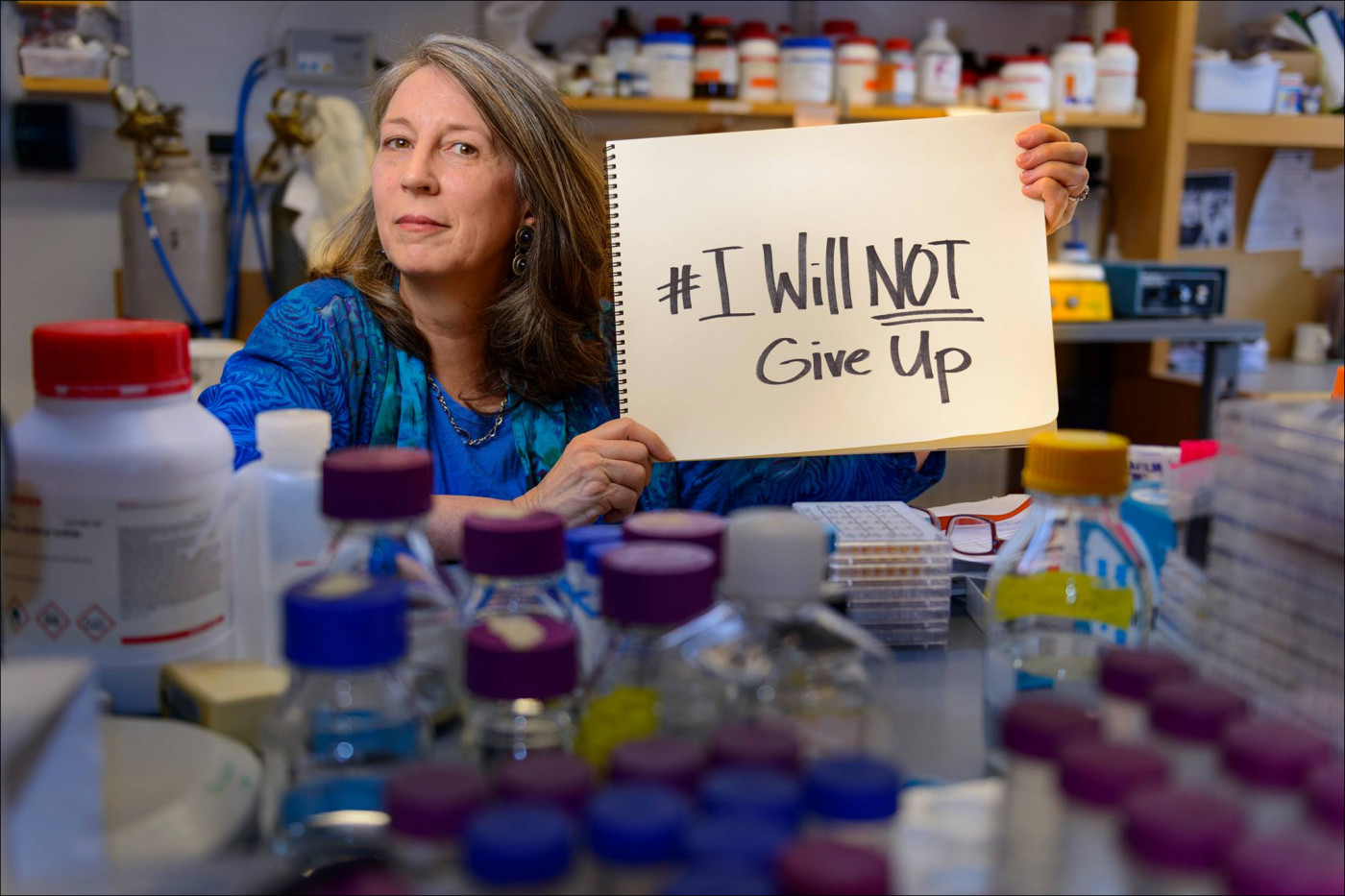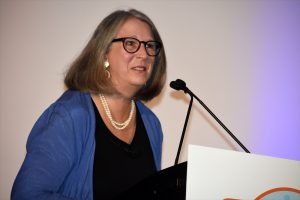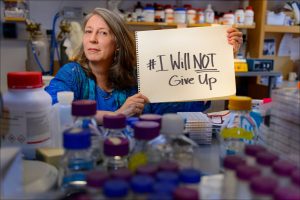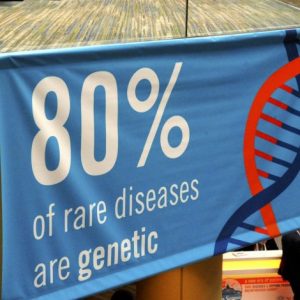Angelman Advocate Launches ‘Combined Brain’ Rare Disease Consortium

Terry Jo Bichell, PhD, at her lab in Nashville, Tennessee. (Photo by Wes Duenkel)
Terry Jo Bichell, whose son’s Angelman syndrome inspired her to go back to college at the age of 49 and get a PhD in neuroscience, has long advocated for families affected by the rare neurological disease.
But now, she’s branching out.
The Tennessee scientist and mother of five has formed COMBINEDBrain — an acronym for “Consortium for Outcome Measures and Biomarkers for Neurodevelopmental Disorders.”
The new entity, headquartered in Nashville, is a coalition of 12 patient advocacy groups representing extremely rare genetic non-verbal neurodevelopmental (RGNN) diseases that generally affect only a few hundred people worldwide.
Bichell, 59, explained that her transparent, collaborative organization is, in effect, a spinoff of previous and current efforts to find a cure for Angelman syndrome.
“We’re going to build on the lessons learned by Angelman researchers and the drug development process to help other similar disorders,” Bichell told Bionews Services, which publishes this website. “The idea is that many rare genetic neurological disorders like Angelman syndrome will share similar biomarkers and outcome measures, so we shouldn’t have to remake the wheel in the drug development process.”
COMBINEDBrain will design and coordinate natural history studies and outcome measures, as well as work toward rodent model characterization and biomarker development for a range of diseases.
Members of the consortium already include:
- Jeff D’Angelo, founder of CHAMP1 Research Foundation
- Amber Freed, CEO and co-founder of SLC6A1 Connect
- Heidi Grabenstatter, science director of International Foundation for CDKL5 Research
- Kim Stephens, president, and Melissa Hogan, founder of Project Alive (Hunter syndrome)
- Hayley Oyler, president of SETBP1 Society
- Liz Marfia-Ash, president and founder of GRIN2B Foundation
- Trish Flanagan, co-founder and secretary of the Yellow Brick Road Project (HNRNPH2-related disorder)
- Leah Schust Myers, executive director of FamilieSCN2A Foundation
- Bina Maniar Shah, president and founder of Project 8p Foundation
- Allison Kaczenski, president and founder of SATB2 Gene Foundation
- Bo Bigelow, chairman and co-founder of USP7 Foundation
- Geraldine Bliss, founder of Cure SHANK (Phelan-McDermid syndrome)
“We’re trying to fast-track drug development for these disorders by building on the successes and failures of those who have come before,” Bichell said.
The cost to join COMBINEDBrain ranges from $25 to $2,200, depending on the budget of a particular organization. Bichell said most groups will spend less than $300 a year.
Measuring the right thing
Earlier this year, Bichell stepped down as director and scientific officer of the Angelman Biomarkers and Outcome Measures Alliance (A-BOM). She remains Tennessee state ambassador for the Rare Action Network, a project of the National Organization for Rare Diseases (NORD).
In an interview on the sidelines of NORD’s recent annual summit in Washington, D.C., Bichell praised the organization warmly but said her new coalition is fundamentally different.
“NORD is focused on rare diseases, but not on biomarkers and outcome measures,” she told us. “COMBINEDBrain is working with severe, rare genetic neurological disorders, and using the lessons from Angelman, Rett syndrome and spinal muscular atrophy that already have treatments in the pipeline to help these ultra-rare disorders — ones that have only 300 patients worldwide. If we all work together, then we can actually de-risk clinical trial readiness and get pharmaceutical firms to realize it might not be so hard to come up with treatments for these guys.”
Bichell also said that when doing clinical trials, it’s important to measure the right thing.
“For example, in Angelman, communications is the holy grail; everyone wants to have that be the endpoint,” she said. “But what if we give a drug that helps them sleep better, be less anxious and do life skills better — but they don’t start talking? What if we’re only measuring communications as the endpoint?”
As with nearly all Angelman patients, Bichell’s 20-year-old son, Louie, has never been able to speak. She received the diagnosis by phone in 1999 while working as a midwife at a maternity center in the Mexican city of San Miguel de Allende.
“I walked a mile to the closest Internet café and started googling Angelman syndrome,” she recalled. “Twenty years ago, there really was no treatment for Angelman. They told me to just go home and have a good life.”
That inspired Bichell — who by then already had a master’s degree in public health from Boston University — to go back to school and earn a PhD in neuroscience from Vanderbilt University.
Bichell: ‘Biomarkers are crucial’
While no one has yet found a cure for Angelman, several pharmaceutical companies are eagerly investigating treatments that could one day win approval by the U.S. Food and Drug Administration (FDA). These include Biogen, GeneTx Biotherapeutics, Ionis Pharmaceuticals, Ovid Therapeutics, and Roche.
“We never feel like we do enough for our kids. But if we just spend time with our child, it might even be more selfish,” said Bichell, whose husband, David Bichell, is a congenital heart surgeon at Vanderbilt. “It’s fun and easy to be with your child. The hard part is doing the science or finding a treatment that will actually make a difference.”
To that end, she said, “biomarkers don’t sound as actually exciting as a cure, but let me tell you it is crucial. We might find a drug that works, but we’re measuring the wrong thing, so it never gets FDA approval.”
Bichell said she’s grateful that Angelman now has a unique ICD-10 disease code assigned to it — Q93.51 — and that “a lot of treatments are coming down the pike” for her son’s particular disorder.
Angelman is believed to affect 1 in 10,000 to 15,000 births, though that’s just a vague estimate.
“We don’t know the incidence of Angelman or its mortality or morbidity rates, because until last year, we didn’t have a code,” she said. “You might even say my son is lucky to have Angelman right now, at this pivotal moment, because there’s a real chance it will be cured in his lifetime.”
Besides Louis, the Bichells have four daughters — ranging in age from 27 to 38 — and a one-year-old grandson.
“I want them to see me working as hard as I possibly can to help their brother,” she said. “Louie is actually pretty happy, but he has a lifetime ahead of him that’s going to be hard. And my other kids will need to take care of him after I’m gone.”









